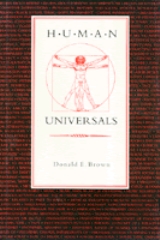Human Universals is a book by Donald Brown, an American professor of anthropologyAnthropology is the study of humanity. It has origins in the humanities, the natural sciences, and the social sciences. The term "anthropology" is from the Greek anthrōpos , "man", understood to mean mankind or humanity, and -logia , "discourse" or "study", and was first used in 1501 by German...
(emeritusEmeritus is a post-positive adjective that is used to designate a retired professor, bishop, or other professional or as a title. The female equivalent emerita is also sometimes used.-History:...
) who worked at the University of California, Santa BarbaraThe University of California, Santa Barbara, commonly known as UCSB or UC Santa Barbara, is a public research university and one of the 10 general campuses of the University of California system. The main campus is located on a site in Goleta, California, from Santa Barbara and northwest of Los...
. It was published by McGraw Hill in 1991. Brown says human universals, "comprise those features of culture, society, language, behavior, and psyche for which there are no known exception." He is quoted at length by Steven PinkerSteven Arthur Pinker is a Canadian-American experimental psychologist, cognitive scientist, linguist and popular science author...
in an appendix to The Blank SlateThe Blank Slate: The Modern Denial of Human Nature is a best-selling 2002 book by Steven Pinker arguing against tabula rasa models of the social sciences. Pinker argues that human behavior is substantially shaped by evolutionary psychological adaptations...
, where Pinker cites some of the hundreds of universals listed by Brown.
Contents
- Rethinking Universality: Six Cases
Color Classification • Samoan Adolescence • Male and Female among the Tchambuli • Facial Expressions • Hopi Time • The
Oedipus ComplexIn psychoanalytic theory, the term Oedipus complex denotes the emotions and ideas that the mind keeps in the unconscious, via dynamic repression, that concentrate upon a boy’s desire to sexually possess his mother, and kill his father...
Conclusion
- Conceptualizing, Defining, and Demonstrating Universals
- The Historical Context of the Study of Universals
- Explaining Universals
Explaining a Universal with a Universal • Cultural Reflection or Recognition of Physical Fact • Logical Extension from (Usually Biological) Givens • Diffusionist Explanations that Rest upon the Great Age of the Universal and, Usually, Its Great Utility • Archoses • Conservation of Energy • The Nature of the Human Organism, with Emphasis on the Brain • Evolution Theory • Interspecific Comparison • Ontogeny • Partial Explanations
- Incest Avoidance
- The Universal People
- Universals, Human Nature, and Anthropology
External links
The source of this article is
wikipedia, the free encyclopedia. The text of this article is licensed under the
GFDL.


